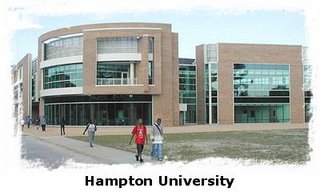 Photo: The new $23M, 100,000 square foot School of Journalism Building at Florida A&M
Photo: The new $23M, 100,000 square foot School of Journalism Building at Florida A&M When the accrediting committee for journalism programs met two weekends ago, all four of the programs before it from historically black schools received recommendations for only provisional accreditation.
If the recommendations hold – the full Accrediting Council on Education in Journalism and Mass Communications meets May 5 and 6 – it does not mean any will lose accreditation, only that the schools have up to two years to come into compliance.
The four are Southern, Hampton, Winston-Salem State and Florida A&M universities, and they each failed on one or two of the nine standards.
All told, 19 schools came up for review. Both mainstream schools that received the provisional recommendation – Auburn and New York universities – failed the diversity standard.
That all four black colleges were on the provisional list raised some eyebrows at those schools. Some noted that other schools who failed the same number of standards were recommended for reaccreditation.
Susanne Shaw, director of the council,said there was no one-to-one correlation between standards out of compliance and whether the accreditation was provisional. "It depends on the degree" of compliance "and whether the unit had a history of problems with the standard," she said, adding that it was not unusual for first-time applicants, such as Winston-Salem State, to be given provisional status on their first try.
"I thought we had enough indicators that would have justified" full accreditation, James E. Hawkins, dean of the FAMU School of Journalism and Graphic Communication, said.
Hawkins said FAMU failed the "mission, governance and administration" standard, noting that its journalism director, Kimberly Godwin, left in October for a job as assistant news director at New York's WCBS-TV, leaving the post vacant. Hawkins said he was advertising for a replacement. Hawkins also said the council found "communications issues" between himself and the faculty, and that he was meeting with members to identify areas of improvement.
At Hampton University the site team cited a lack of academic scholarship by its newly minted professors and the lack of a faculty voice in decision-making.
Southern University also had assessment issues, and "didn't have enough faculty," Braima told Journal-isms. He said the team felt the school needed one more faculty member, but said he had already advertised for two – one to teach public relations and print journalism; the other for television and radio production.
At the mainstream schools, Brooke Kroeger, journalism chair at NYU, said she issued a formal response to its failure on the diversity standard. "You can rest assured that NYU is committed to the diversity question in all possible facets," she told Journal-isms. "I have no doubt we will have this resolved very shortly." Without elaboration, she called the judgment "a misperception because of events."
At Auburn, in Alabama, John Carvalho who heads the journalism program, said two African American faculty members – Michael Mercer and D. Michael Cheers – had left and no others had replaced them. He said the site team said the school lacked having a diversity plan in place, and that the percentage of journalism students of color – 8 percent – should more closely match the percentage in the area – the "low 20s" – or at least that of the rest of the university, 11 percent.
"Over-all, the department has been operating over the past few years without a diversity plan," the site-visit team wrote. "The department has not been inactive, and indeed, there have been some creative endeavors. . . But there has been no broad strategy plan guiding these efforts, and sustainability is a serious issue." The school also fell short on two other standards.
Accrediting officials could not be reached for comment, as many schools are on spring break, including Howard University. Jannette Dates and Barbara Hines, both from Howard, headed two of the teams that granted provisional accreditation to the historically black schools.
In 2002, Susanne Shaw, director of the council, said nearly one in four college journalism programs seeking accreditation failed the diversity criterion, though none had been denied accreditation because of it.






















